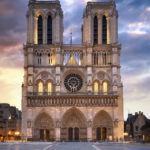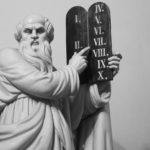In the second century, the Greek philosopher and anti-Christian Celsus warned: “If Christians refuse to perform the usual sacrifices and to honor those who preside over them, then they should not be allowed to be emancipated, marry, raise children, or fulfill any obligation in public life.”
For a good Roman citizen, such an opinion made sense: the preservation of the Pax Romana depended not only on the military’s might and citizen’s virtue, but the appeasement of the gods who protected and blessed the empire. By refusing to offer oblations to the pantheon, Christians threatened to throw the entire social order into chaos. “It only remains for them to go far away and leave no posterity behind. In this way such scum will be completely eradicated from the earth,” declared Celsus.
There are signs that some inhabitants of the formerly Christian West are beginning to think similarly. In 2013, British professor Richard Dawkins provocatively claimed that the kind of “religious indoctrination” impressed upon the young by their parents amounted to child abuse. Almost a decade later, such opinions are less unusual. Parents who shield their children from transgender ideology or critical race theory are censured as bigots whose parenting choices are harmful. In 2019, a presidential candidate endorsed financially punishing institutions who refuse to support same-sex marriage, while books that reject the dominant narrative on sex and gender are delisted and defamed. Those who refuse to bow to the twenty-first century gods of sexual and racial identitarianism must be rebuked, canceled, and banished to the margins.
French historian and philosopher Étienne Gilson (1884–1978, a member of the Académie française who was nominated for the Nobel Prize in Literature) saw this crisis coming long ago. Apart from his impressive academic credentials, Gilson was also involved in the attempts to remake Europe in the wake of the devastation of the Second World War. He served as a member of the French delegation in creating the UNESCO Charter and took part in the 1948 Congress of United Europe in The Hague. A newly published translation of his The Metamorphoses of the City of God illuminates the origins, story, and timeless tensions between what St. Augustine termed the City of God and the City of Man.
Start your day with Public Discourse
Sign up and get our daily essays sent straight to your inbox.Many early Christian writers argued that, while it was true that their refusal to participate in Roman religious rites represented a new civic reality, the Christian faith was a blessing rather than a threat to the empire’s survival.
The City of God and the City of Man
In response to Celsus and other ancient critics of Christianity, many early Christian writers argued that, while it was true that their refusal to participate in Roman religious rites represented a new civic reality, the Christian faith was a blessing rather than a threat to the empire’s survival. Justin Martyr, Irenaeus, and Tertullian all made such arguments. “Caesar is more ours than yours, for our God has appointed him,” declared Tertullian, and Christians “do more than you (Romans) for his welfare.” Or, as Gilson writes: “The best thing that can happen to the Empire is that Christian teachings be faithfully observed.”
Much of the reason for this has to do with the nature of Christianity itself. Gilson explains:
The God of Christians requires them to do for love of him what they lack the strength to do for love of their country. Thus, amid the universal shipwreck of morality and civic virtue, divine authority intervenes to impose frugality, continence, friendship, justice, and harmony among citizens, so much so that anyone who professes Christian doctrine and observes its precepts will be found to do for the love of God everything that the mere interest of his fatherland would require that he do for it. . . . Have good Christians, and good citizens will be given to you in addition.
Counterintuitively, the transcendent quality of Christian belief and practice—which directs the worshipper to the eternal—serves as an unparalleled motivator for civic virtue. As part of the divine plan, Christ calls his followers to love their neighbor as themselves. So they do.
In the wake of the collapse of Rome in the fifth century, the Church was able to play a defining role in both the religious and political existence of the empire’s Eastern and Western descendants. St. Augustine wrote: “A people is a multitude of rational beings joined together by common agreement on the objects of their love.” In Byzantium, the Holy Roman Empire, and England, among many other medieval European and Middle Eastern kingdoms, the state acknowledged that the preeminent object of citizens’ love was Christ.
Whatever lowest common denominator is proposed to finally unify humanity—reason, science, pluralistic tolerance—inevitably proves inadequate for the job.
Internal and External Tensions
Yet tensions remained. Eastern and Western Christianity fought, fissured, and eventually completely fractured. Secular authorities clashed with ecclesial leadership over control of wealth, land, and political authority. And religious enemies both internal and external threatened, from Muslims, Mongols, and Albigensians to competing camps of Catholics during the Western Schism.
Various solutions to these problems were offered. The Franciscan Roger Bacon (1220–1292) suggested synthesizing the City of Man and City of God, the combination of which would then coerce all peoples into submission to the true Church. Dante (1265–1321) proposed a universal monarchy that would function as a copy of the Church, acting as a sort of surrogate for the City of God. Cardinal Nicholas of Cusa (1401–1464) recommended Christianizing the world by accommodating all ideas to Christianity. Tommaso Campanella (1568–1639) suggested transforming the Church into the City of Man in order to make it more palatable to the world via “reason.” Gottfried Leibniz (1646–1716) even believed, naively, that the resolution of all religious schism required only the willpower of “five or six persons.”
Gilson perceives that all of these suggestions create just as many problems as they propose to solve. The City of Man and the City of God cannot be collapsed into one another without compromising the latter’s identity and mission. Coercing the world into the Christian faith contradicts its teaching regarding free will, while accommodating the City of God to secular beliefs risks undermining, if not vitiating, Christian doctrine.
Pretending that reason and faith are identical likewise undermines Christianity, leading the City of Man to act with the authority of the City of God. The City of Man creates a counter-Church “with its own doctrinal truth, this time imposed by force, excluding all discussion and intolerant of any contradiction.” The result is totalitarianism. Says Gilson:
From the moment at which the Earthly City aspires to the universality that is initially attributed to the City of God, it must in its turn promulgate a single dogma, assign to all humans a single and even very earthly good, the love of which will make them into a single people, a single city. . . . Even insofar as it is atheist, the modern State is completely totalitarian in principle.
Yet the “universalities” promoted by scientific materialism and utilitarianism by such thinkers as Auguste Comte (1798–1857) have failed to foster the unity its promoters promise. Whatever lowest common denominator is proposed to finally unify humanity—reason, science, pluralistic tolerance—inevitably proves inadequate for the job. Even secular liberals disagree over how to reason, what science to believe, and who is to be tolerated. Far from being a panacea, modernity is “the worst philosophical chaos that the world has ever known,” observes Gilson.
Far from being a panacea, modernity is “the worst philosophical chaos that the world has ever known,” observes Gilson.
Lessons for Contemporary Christians
What can be learned from this? Writes Gilson:
If a lesson emerges about the history of the City of God and the avatars it has assumed during the course of the centuries, it is, first of all, that it cannot be metamorphosized. But it is also that every attempt to usurp its title and goal can bring misfortune to the human societies that claim to realize it on earth.
The French historian and philosopher lived through two world wars, and was able to witness some of the early warning signs of globalization, which he perceived as further breaking down whatever remained of the fraying fabric of Christendom. At one level, what is required is a respect for ideological humility and limits. “Modesty is a beautiful virtue, because it does not aim at smallness but at the measure that follows the exact dimensions of reality.”
At a deeper, though less probable level, is a return to the original moral vision of the West based on the City of God. “The lesson would be simple, therefore,” says Gilson.
Unless we resign ourselves once more to the false unity of some empire founded on force or of a pseudo-society without a common bond of minds and hearts, it is necessary either to renounce the ideal of a universal society or to seek again the common bond in Christian faith. . . . If the earth’s temporal unity is possible, it will not be enough that humans should fervently desire their city. . . . The City of Man can only be built in the shadow of the cross, as a suburb of the City of God.
In other words, the two best options are either to reject a universal socio-political vision as entirely unworkable (given modernity’s inability to realize Augustine’s thesis of the necessity of a common love), or for the world—or at least the West—to appreciate that a transcendent foundation and telos are essential. Given declining religious observance and rising political polarization and social disintegration, the latter seems increasingly improbable. And we must be wary of a Celsus-inspired, coercive globalist program based on “submission to power, not a union of hearts and therefore a society.” It is a sad scenario to face, but one Gilson anticipated.














